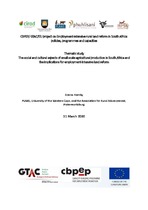The social and cultural aspects of small-scale agricultural production in South Africa and the implications for employment-intensive land reform
Abstract
There is widespread agreement that Government interventions to support smallholders have often been poorly constructed (Khulisa, 2016; Aliber & Cousins, 2013) and have failed to produce positive impacts (Okunlola et al, 2016). There are many reasons for this assessment, including that government “… strategies to support smallholder farmers are not working as effectively and efficiently as needed to create systems change” (Khulisa, 2016: 26); that government characterizes smallholders as politically, socially and economically homogenous and as having the same potential to “emerge” along a linear path of commercialization (Cousins, 2013; Olofsson, 2019); and that an “elite capture” of government’s land reform and agricultural resources (Hall and Kepe, 2017) has resulted in a small number of farmers upgrading to high-tech, capital intensive, commercial production geared at formal markets, which reduces the resources available for maximizing household food producing practices and the supply of informal local markets (Drimie, 2016; ACB, 2017).
It is also widely acknowledged that small scale farmers face a large number of constraints. In addition to sufficient suitable land, they face fencing shortages, theft, crop damage by livestock and a lack of herding labour (Shackleton 2019; Shackleton et al, 2019); increasing capital costs (Bryceson, 1996); limited market opportunities due to competition from large-scale agricultural and retail sectors (Andrew and Fox, 2005); soil erosion partly due to overgrazing (ibid), and water scarcity and unpredictable climate variation (Ortmann & Machethe, 2003). Small scale farmers in KwaZulu-Natal summarized their situation saying there is “too much competition! Too much competition!” (KZNDARD, 2018:10).
This study aims to identify the key social and cultural aspects of small-scale agricultural production in rural South Africa and the policy implications for a programme of employment-intensive land reform. It forms part of a bigger study investigating how the promotion of a land reform programme centred on small-scale agriculture could generate a large number of employment, self-employment and livelihood enhancing opportunities. This includes the key characteristics and preconditions of successful small-scale farm producers. Employment for the purposes of the study is defined very broadly as:
• Livelihood enhancing activities – including gardening and stock farming for own use
• Family labour – specifically for agricultural purposes but excluding recipients of wages
• Hired wage labour – including permanent, casual, part-time, piece jobs

